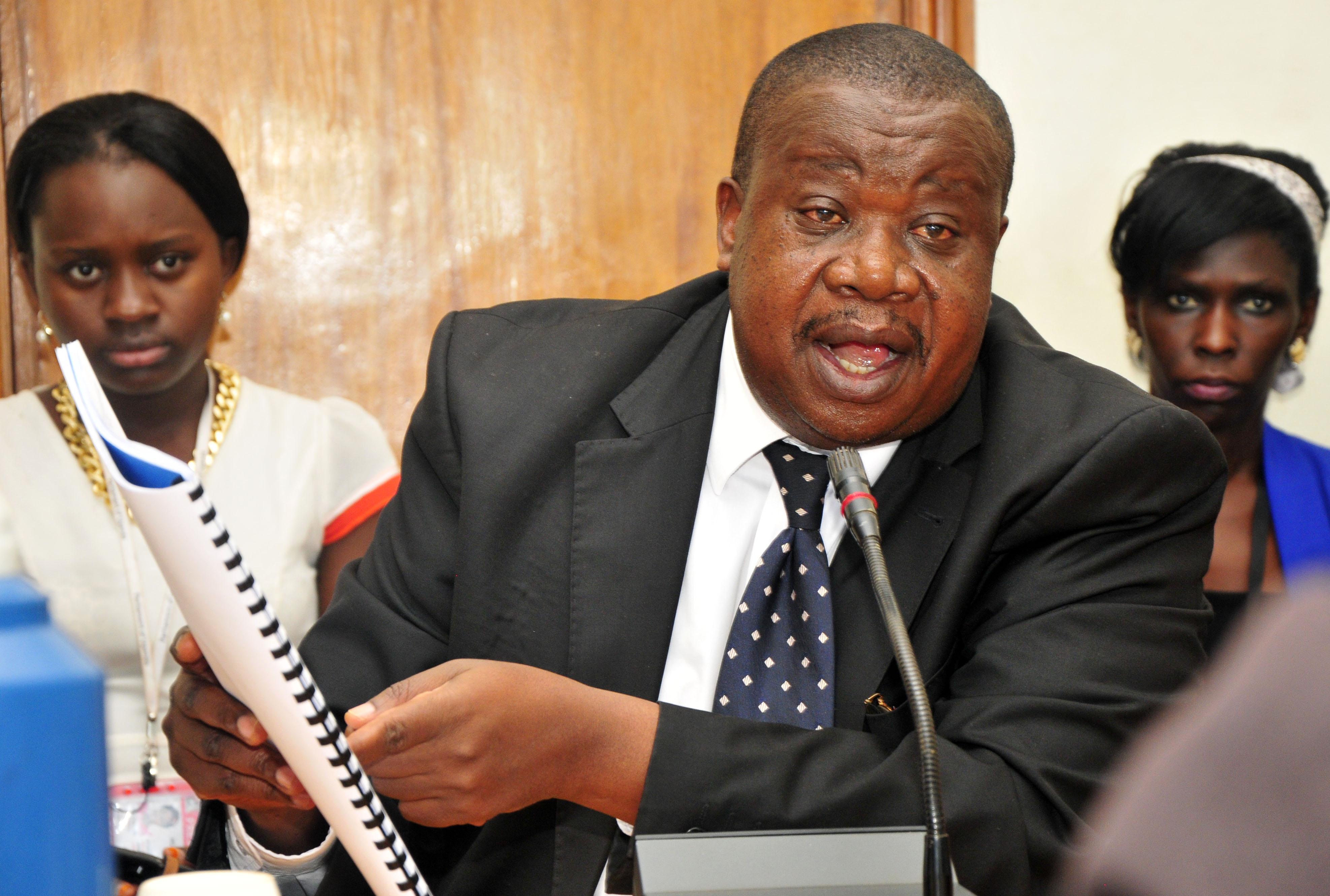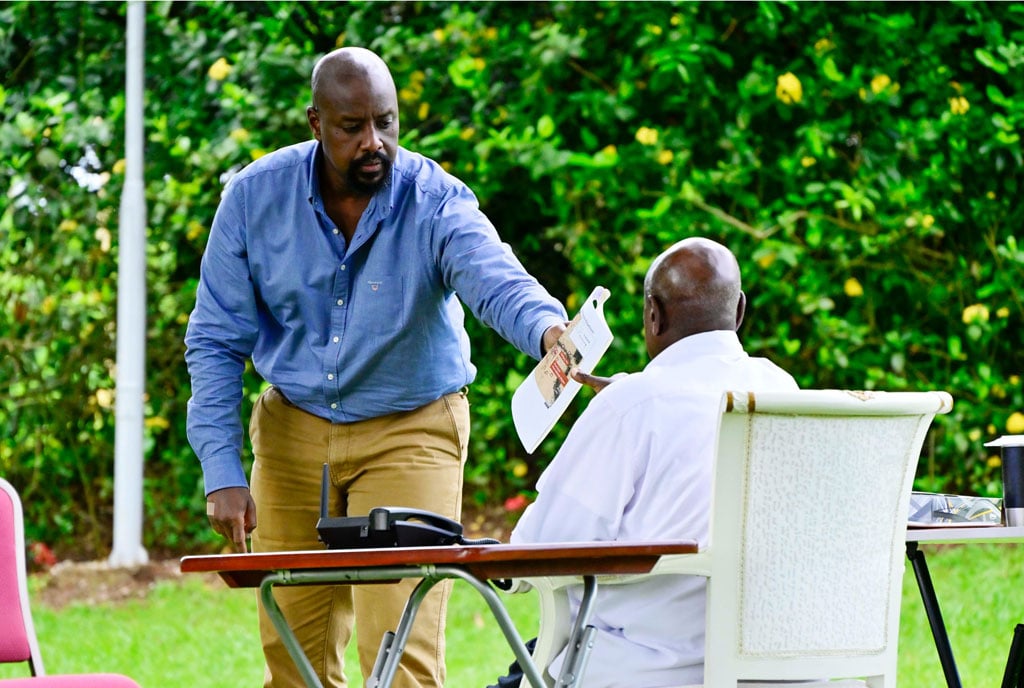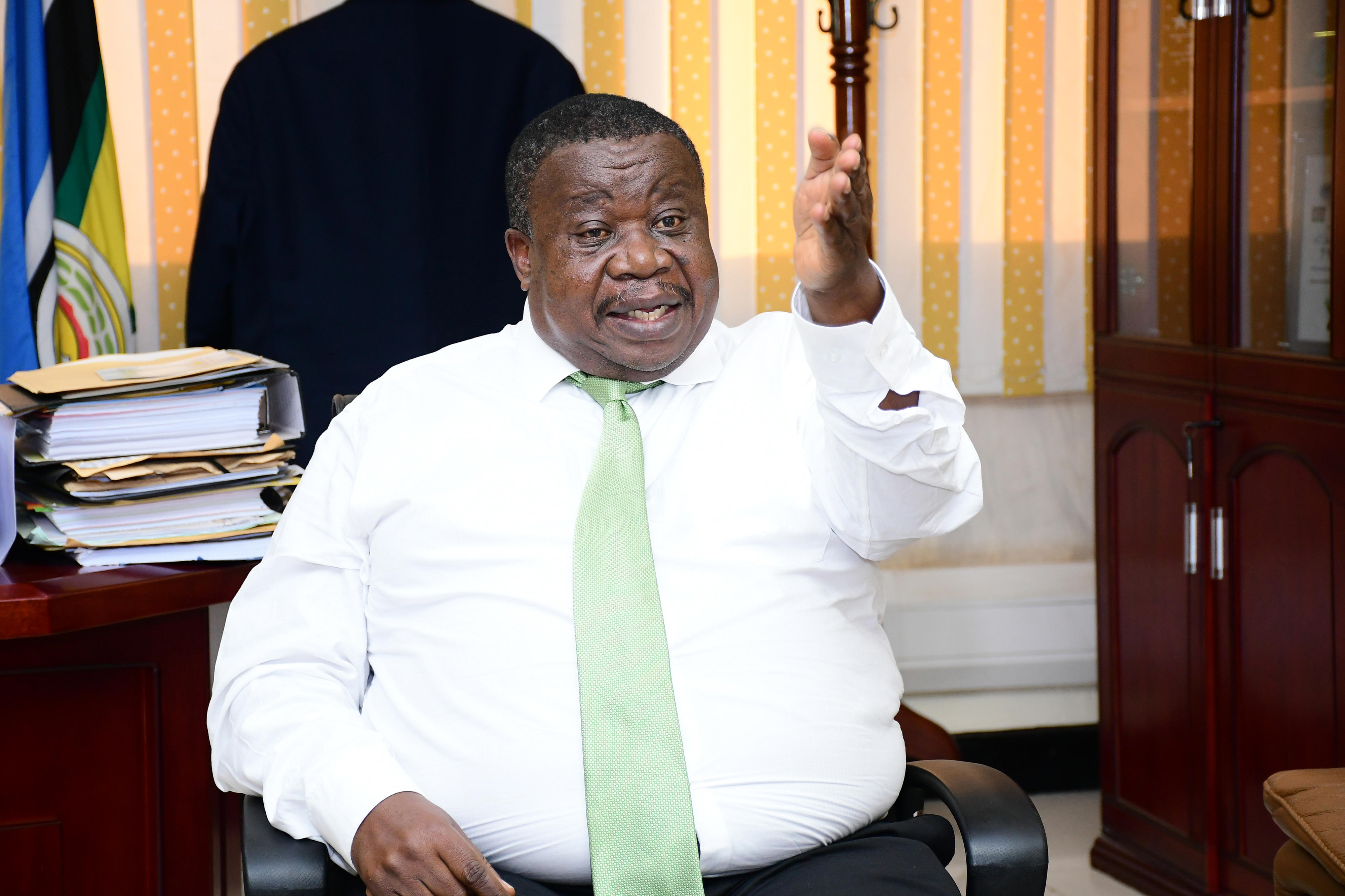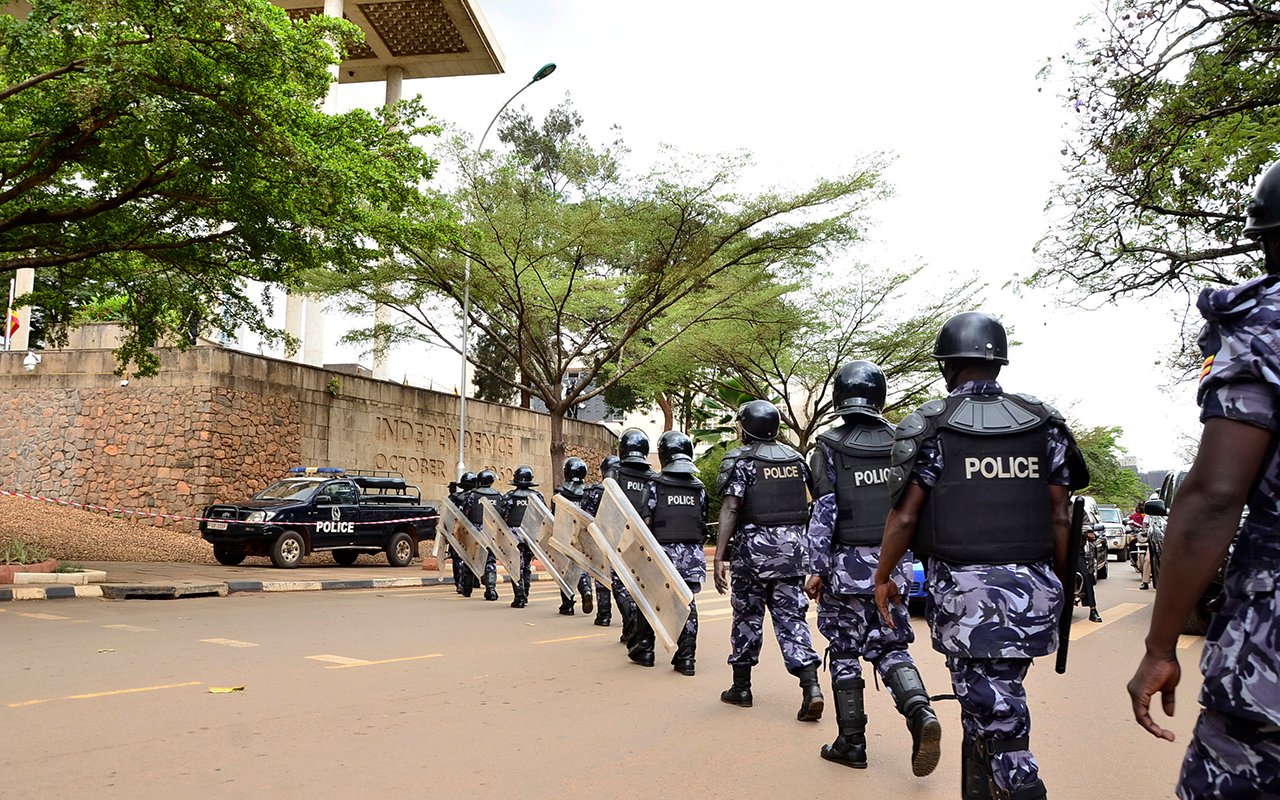
Gen Kahinda Otafiire, the minister for Internal Affairs. PHOTO/ FILE
Of recent, Gen Kahinda Otafiire has been embroiled in several standoffs. At the beginning of the year, the Luweero Bush War veteran plunged himself at the centre of the Njeru stock farm saga.
On one hand, Otafiire claims ownership of the piece of land, on the other, the government, where he is a minister of Internal Affairs, is claiming the land through the National Animal Genetic Research Institute and Data Bank (NAGRC & DB).
Politically, Otafiire has been at the forefront of deflating the presidential ambitions of President Museveni’s son, Gen Muhoozi Kainerugaba, making him the second Bush War veteran after Gen David Sejusa, to rebuff the so-called “Muhoozi Project” publicly.

Gen Muhoozi Kainerugaba (L) exchanges a document with his father, President Museveni on May 3, 2023. PHOTO/PPU
In a video that surfaced on social media recently, Gen Otafiire made it clear that while he doesn’t “hate” Gen Muhoozi, he doesn’t think he has what it takes to be the president of Uganda like his supporters, who have formed the Uganda Patriotic League (UPL), claim.
“There is a difference. I have no problem with Kainerugaba as Museveni’s son, but Kainerugaba the president of Uganda, I don’t support that. I’m very open on that one,” Gen Otafiire said.
It wasn’t the first time he was tearing into the presidential ambitions of his boss’s son because last year he dismissed Muhoozi’s ambitions.
“That’s his business,” Otafiire dismissed Muhoozi’s presidential ambitions. “That’s why some of us who are rational and are grounded in the NRM have said we still want Gen Museveni in charge. Come 2026 I’m campaigning for Gen Museveni to come back as our presidential flagbearer,” Otafiire said in an NTV interview.
Against Muhoozi
Asked what he would do if Gen Muhoozi stood against his father in the upcoming elections, Otafiire was unambiguous.
“It is his constitutional right to stand. Let him compete against his father and we shall defeat him like we have defeated others before,” he said.

Internal Affairs minister, Gen Kahinda Otafiire. PHOTO/FILE
Otafiire is no stranger to controversy within the NRM having wrestled with Mr Amama Mbabazi, the former prime minister who for long was considered to be the second most powerful person within the party after Museveni.
But it seemed Otafiire’s disapproval of Mbabazi stemmed from the days when they were fighting in the Luweero triangle, with Mbabazi being in the external wing based in Nairobi, Kenya.
Mbabazi went on to occupy key positions, including the secretary general of the NRM and security minister and had never been dropped in Cabinet.
Mbabazi prevailed, but Otafiire got a chance to pay back when Mbabazi fell out with Museveni and he decided to stand for president in the 2016 elections.
“He is dishonest, and he can’t be trusted with power,” Otafiire said of Mbabazi at a campaign rally in Kyotera. “You should probably consider him when all of us have died.”
Mbabazi performed dismally in the presidential elections, getting just 1 percent of the votes. But Otafiire also lost his Ruhinda County seat to the little-known Capt Donozio Kahonda.

The Ruhinda County MP, Capt Donozio Mugabe Kahonda. FILE PHOTO
Otafiire had been an MP of Ruhinda County since 1996, but Kahonda shocked the country when he defeated him in the NRM primaries with a difference of 8,760 votes.
Before the NRM primary elections, Otafiire had warned independent presidential candidate Mbabazi against taking their political differences to Mitooma District, where his constituency is found.
Days after he was defeated, Otafiire did what vanquished politicians don’t do; he visited voters, telling them that all is forgiven.
“Although voters pushed me away like a useless person, I will not revenge because of this unwise decision. If you are born with an unwise person, you can’t abandon him,” Otafiire said. “I’m a Member of Parliament representing State House, a minister; and for that reason, I will be coming back to you.”
Bouncing back
Otafiire bounced back in 2021 after Ruhinda was gerrymandered into two, with the General representing Ruhinda North and the Captain representing Ruhinda South, something Muhoozi’s supporters have used against the Internal Affairs minister in their exchanges on social media.
“He has no supporter among the voters, that’s why he was defeated in Mitooma and thrown out of Parliament, moreover small Mitooma as it is,” Gen Muhoozi’s political mobiliser Polly Katwire said.
“Uganda’s concern is transition, which means that Gen Kahinda Otafiire isn’t informed of current politics. He is not informed of current generational cause in Uganda.”
To discredit Otafiire, Muhoozi’s associates have been digging into the scandals he had been involved in over the 30 years he has been in government.

Dr Aliker with ministers Kahinda Otafiire and Sam Kuteesa during a State function. Dr Aliker played a crucial role in the 1988 Lockerbie Bombings negotiations between Libya, USA and UK. PHOTOS/FILE
In 1988, Gen Otafiire became the first NRA minister to resign after he brandished a gun at a woman who was reported to be Sam Katesa’s first wife, Jennifer Kutesa, who passed on in 2002.
Museveni, whose army had taken power in 1986, accepted Otafiire’s resignation because “the National Resistance Movement government will not tolerate any indiscipline displayed by anybody regardless of his position, such as shown by Otafiire.”
Three years after the beginning of the second Congo war, Otafiire plus other senior UPDF officers such as Gen James Kazini, Brig Noble Mayombo, President Museveni’s brother, Gen Salim Saleh, and his wife Jovia Akwandwanaho, were accused by the United Nations of plundering DR Congo’s vast resources.
During the second Uganda intervention in DR Congo, author Sandrine Perrot says the exploitation of Congolese resources became much more systematic, and trading networks, linking mining centres in Congo’s hinterland to international traders, drastically expanded.
“The patterns of military commercialism evolved from a parasitic structure of military business and petty thieves, already active during the first war but also in northern Uganda for example, to a paroxysmal entrepreneurial logic of conflict economy linked with international legal as well as illegal and criminal networks,” Perrot said in his paper Doing Business Out of War, an analysis of the UPDF’s presence in the Democratic Republic of Congo.
“At their (re)arrival in the DRC, the Ugandan expeditionary corps tried to take control over trade and business in the territories they controlled. A main target was the exploitation of natural and strategic resources (gold, coltan, diamonds, and cassiterite) but also timber, coffee, ivory, and vanilla. To consolidate control and guarantee continuous production, several alternative structures were put in place.”
In response to the allegations, Otafiire has said he did not plunder natural resources from the vast country because there was nothing to steal.
Accused
In 2011, Gen Otafiire was accused of being among the group of Cabinet ministers who were hoarding sugar.
Museveni reacted by issuing an executive order asking Indian manufacturers to deny supplies to politicians he accused of hoarding the commodity, but Gen Otafiire was having none of it.
“You people are writing in the papers that Otafiire is dealing in sugar and causing shortages, do you want me to close my sugar business and start stealing government funds?” Otafiire, who had a stint as Trade minister, asked.
“The President doesn’t control my business. I’m not a speculator. I have been dealing with sugar and I will continue dealing with it,” he said.

President Museveni salutes government officials and members of different armed forces upon his arrival to pass out 2,234 prison officers at Kololo on September 10, 2023. PHOTO/STEPHEN OTAGE
Now aged 73 years, Otafiire never wants to lose his parliamentary seat, but he prides himself in not attending parliamentary sessions citing its big numbers.
“Why should I go there to compete for three minutes?” he asks. “To talk about what for three minutes? I have another avenue to represent my people: I sit in Cabinet. And it is Cabinet that allocates resources. So, if I want resources allocated for my people, I do it in Cabinet with my Cabinet colleagues.”
Now on his recent topic of asking young Ugandans to rise against the corrupt, Otafiire said they did not fight to enrich people, but to correct the situation in the country.
“People died [in the war]. We didn’t die for the glorification of the corrupt. Down the road, we seem to have digressed to the extent that you people … love … the corrupt. You glorify inequity,” he said.
He added: “You don’t want to stand up and tell us - we in leadership - that we (citizens) deserve better … No. Stand up and tell us, ‘sorry, enough is enough. You [leaders] have to stop here,” he said.
But a few days later, his boss came out and said the anti-corruption protests would not be allowed.
“We are busy producing wealth… and you here want to disturb us. You are playing with fire because we cannot allow you to disturb us,” he said.









